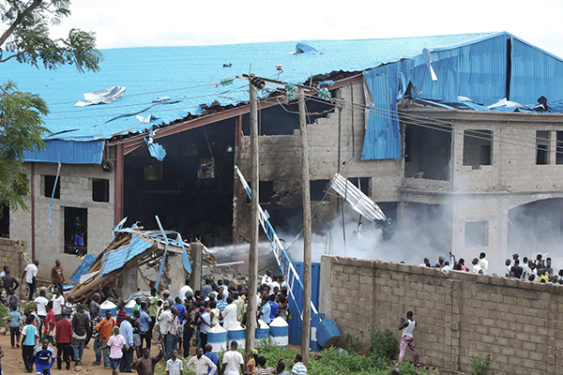
By John L. Allen
ROME (Crux) – Yesterday officially kicked off the U.S. bishops’ annual “Religious Freedom Week,” which is a bit of an exercise in rebranding. The observance was launched in 2012 as the “Fortnight for Freedom,” but after years of linguistic agita trying to explain to the average American what the word “fortnight” means, the bishops threw in the towel and, in the process, shortened the time period.
Whatever one calls it or however long it lasts, the June 22-29 event this year comes at an especially menacing time.
On the domestic front, the U.S. Church is currently facing one of the most serious potential violations of religious freedom in its history in the form of SB 360 in California, a measure which would compel priests to disclose information about child sexual abuse that they learn when they are hearing another priest’s confession or when hearing the confession of a co-worker.
The bill passed the California senate in late May by a 30-2 vote and is expected to be considered by the State Assembly in September.
The Archdiocese of Los Angeles has launched a web site, KeepTheSeal.com, providing information about SB 360 and offering people a way to contact legislators.
Sponsors of the bill say it’s necessary to fight clerical sexual abuse, but its critics insist that not only would such a measure actually retard efforts to bring abuse to light – mostly by eliminating a “safe space” for victims and possible witnesses to come forward – but it also strikes at the heart of the Church’s sacramental life, amounting to crass government interference in religious practice.
Granted, the Church largely has brought this campaign upon itself by mishandling the abuse crisis, damaging its credibility and creating a political environment in which virtually any measure opposed by bishops automatically will enjoy strong public support. Yet the legitimate umbrage people feel over the crisis doesn’t mean every punitive measure one can envision is a good idea, and the debate over SB 360 offers a classic cautionary tale.
Oddly enough, the United States Conference of Catholic Bishops’ official materials for Religious Freedom Week 2019 don’t directly allude to the California confession debate, though one imagines it will figure in many homilies, pastoral letters and op/ed pieces over the course of the next seven days.
(If it doesn’t, that would be a story in itself, since – short of a direct assault on the Eucharist – it’s hard to imagine a potential religious freedom violation that strikes more directly at core Catholic beliefs.)
In the meantime, the U.S. bishops laudably have given their religious freedom advocacy a more global focus this year. They’ve assigned a specific focus to each day of the week, which include:
- Saturday: Sts. Thomas More and John Fisher
- Today: Middle East Christians
- Monday: Faithful Public Servants
- Tuesday: Persecution of the Rohingya
- Wednesday: Foster Care and Adoption
- Thursday: Persecution of Christians in Nigeria
- Friday: Religion: A Public Good
- Saturday: Religious Freedom for Incarcerated Persons
That’s three days out of seven devoted to international causes, including the Middle East, Myanmar and Nigeria. Those are obviously well-chosen settings, given the clear and present dangers to religious freedom in each.
For the record, the bishops presumably chose to feature the Rohingya Muslims in Myanmar to make the case that religious freedom isn’t special pleading for Christians but a transcendent cause that applies across the board. They easily could have included Burmese Christians, however, because they too have suffered both direct persecution and widespread discrimination due to the rise of extreme Buddhist nationalism in that nation.
Worldwide, the scope of anti-Christian hostility is staggering. Open Doors, a Protestant watchdog group, estimates the number of Christians exposed each day to the risk of harassment, physical assault, arrest and imprisonment, torture, and even death, to be around 200 million – not coincidentally, more or less the same as the number of Christians today living in societies in which they’re a minority.
Yet it’s not just places in which Christians have a small sociological footprint in which they’re under fire. For most of the past decade, Latin America, the world’s largest Catholic continent, led the annual rundown by Fides, the Vatican’s missionary news agency, for Catholic personnel killed during the past year. For 2018, that dubious honor was claimed instead by Africa.
Obviously, any defense of religious freedom that reflects the principles of Catholic social teaching has to apply equally to all creeds. Still, there’s a strong case for a special focus on anti-Christian persecution given the wall of silence that still too often surrounds the subject.
French intellectual Régis Debray, a veteran leftist who fought alongside Che Guevara, once observed that anti-Christian persecution falls squarely into the political “blind spot” of the West. The victims, Debray argued, are “too Christian” to excite the left, “too foreign” to interest the right – and that observation is still relevant today.
Just as one didn’t have to be Jewish to sympathize with the plight of dissident Jewish people in the Soviet Union, and didn’t have to be black to be outraged by apartheid in South Africa, similarly today one shouldn’t have to be Christian to recognize anti-Christian persecution as a human rights scourge of mammoth proportions.
From a pastoral point of view, however, if the Catholic bishops of the world’s “indispensable nation” don’t speak up for these victims, it’s hard to know who else will.
One hopes, therefore, that the bishops will take the themes of this week seriously, using their platforms to mobilize opinion and activism. Not every initiative launched by officialdom necessarily responds to a real exigency on the ground, and rank and file Catholics have good reason right now to be leery of their leaders – but in this case the problems are real, and the bishops are an unavoidable ingredient in any solution.
